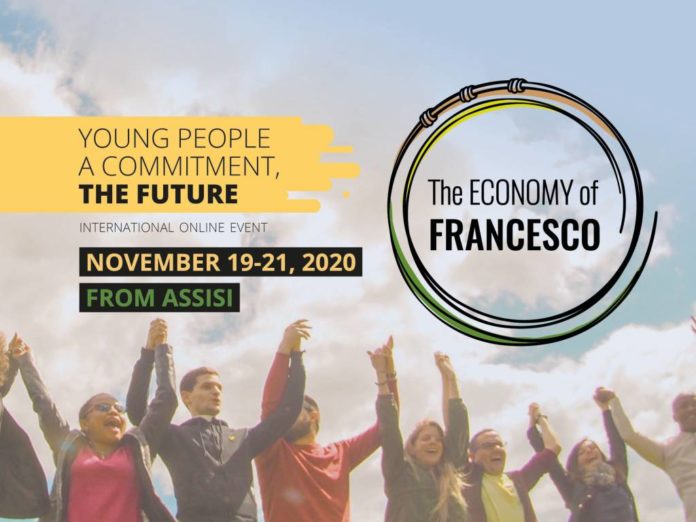(from Alphonsian Academy blog)
Pope Francis has invited everyone to build a fraternal and inclusive economy[1], oriented to the common good and «attentive above all to the poor and excluded»[2]. Our “sister mother Earth” «is among the most abandoned and maltreated of our poor»[3]; therefore, this economy must be ecocentric.
The Economy of Francesco
To promote this economy, the Pope has wanted to organize in Assisi an international meeting of young economists (under 35 years of age), entitled Economy of Francesco, «to promote together, through a common “covenant”, a process of global change» (Ec-Fco) towards a new economic system that must be more inclusive and more attentive to the person and the environment. We need to set in motion processes to demand a change in «life-style, models of production and consumption, and established structures of power which today govern societies”[4]. In calling for this meeting, the Pope showed his confidence in young people “to give a soul to the economy of tomorrow» (Ec-Fco), since «the present world system is certainly unsustainable»[5]. Accepting the papal invitation, more than 3,000 young economists from 120 countries signed up.
The meeting had been scheduled to be held on March 26-28, 2020, in Assisi, a city «which has for centuries eloquently symbolized a humanism of fraternity» and keeps being the icon of a culture of peace and «a fitting place to inspire a new economy» (Ec-Fco). It was there that St. Francis embraced poverty, thus promoting «a vision of economics that remains most timely» (Ec-Fco). The Covid-19 pandemic first forced the meeting to be moved to November 19-21, 2020, and finally to be held online.
This initiative of Pope Francis is part of his proposal on integral ecology. He invites young economists to promote a more ecocentric economy that overcomes the current technocentric economy, which kills[6].
Towards an ecocentric economy
The globalized economic system dissociates economic activity from the environmental aspects[7]. The neoclassical theory of economy had already preferred to ignore the impact that the individualistic quest for immediate profit could have on ecosystems[8]. Even today, people tend to ignore the data on resource depletion and environmental degradation when drawing up the Gross Domestic Product (GDP). At most, they accept that polluting companies could be penalized in proportion to the damage they cause to the environment. This does not prevent further aggressions to the ecosystem, because we are easily fooled into thinking that the immediate benefits will outweigh the long-term damage. Such an economy does not increase the “well-being” of the population and, moreover, it threatens sustainability.
We must overcome this technocentric approach to economics and assume an ecocentric vision instead, which gives priority to the sustainability of natural ecosystems over their utility. Thus, the laws that govern the functioning of the global ecosystem will prevail over the management of its resources[9]. There are already initiatives that promote corporate social responsibility in environmental protection. The “Global Compact” network, promoted by the United Nations, is a good example[10].
Fr. Martín Carbajo Nuñez, OFM
[1] The full text of this presentation: Carbajo Núñez M., «The fraternal economy: A Franciscan perspective», in Collectanea Franciscana 91 (2021) 565-580.
[2] Francis, “Letter for the event Economy of Francesco” (May 1, 2019), [Ec-Fco], in OR (May 12, 2019) 8.
[3] Francis «Laudato si’. Encyclical letter,» [LS], (May 24, 2015), nn. 1-2, in AAS 107 (2015) 847-945
[4] Francis, «Video message to participants at the meeting Economy of Francesco» (Dec. 21, 2020), in Internet: https://youtu.be/zu5Xkt6TOHE
[5] Francis, «Video message» (Dec. 21, 2020).
[6] Tornielli A. – Galeazzi G., This economy kills: Pope Francis on capitalism and social justice, Novalis, Toronto 2015.
[7] Cf. Carbajo Núñez M., Being a Franciscan in the Digital Age: New Challenges, New Life, Delhi 2021.
[8] Cf. Jevons W.S., The theory of political economy, New York 20134 (original: 1871).
[9] Cf. Georgescu-Roegen N., Bioeconomia. Verso un’economia ecologicamente e socialmente sostenibile, Torino 2013; Robert Costanza, An introduction to ecological economics, Boca Ratón 20152.
[10] Cf. www.unglobalcompact.org; United Nations Global Compact, UN, New York (eBook).






